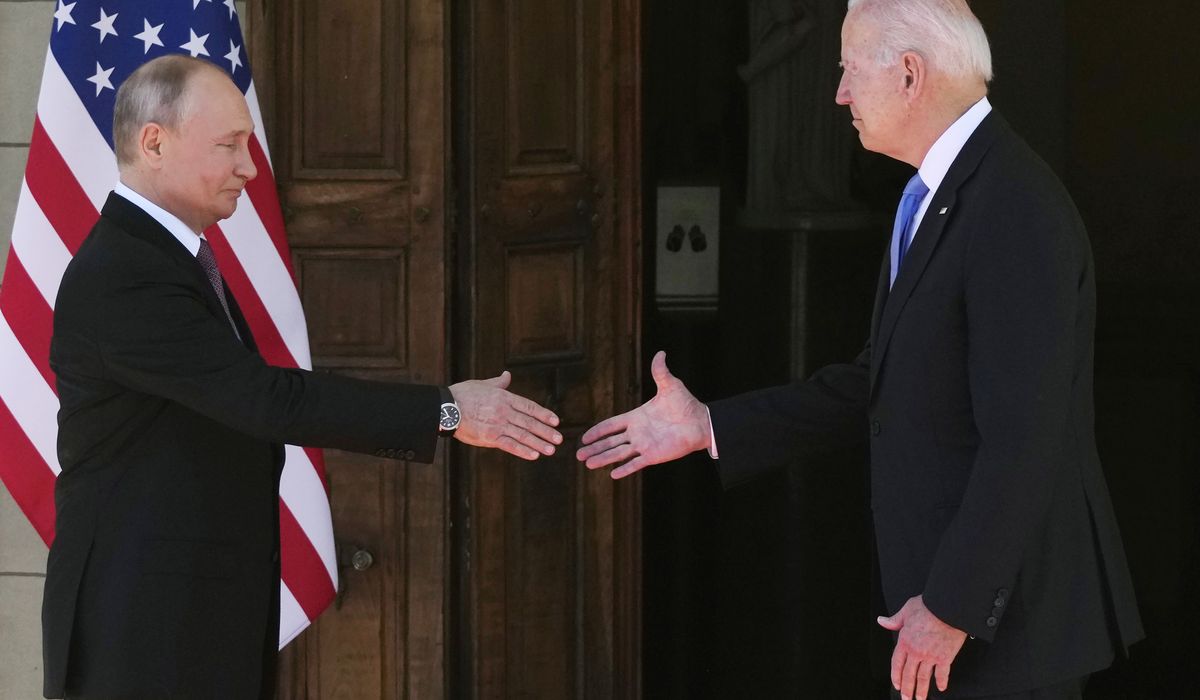
Ukraine’s president said Monday that his country’s military is ready to “derail” any invasion by Russian forces — a stark warning ahead of President Biden’s high-stakes virtual summit with Russian President Vladimir Putin on Tuesday morning amid soaring tensions and military buildups on both sides of the old Cold War divide in Europe.
U.S. intelligence sources say Moscow has massed some 70,000 troops near its neighbor and could be ready to invade as soon as next month. Russian officials said the U.S. and NATO have been provocative by rushing to arm Ukraine and challenging Russian forces in the Black Sea and the Baltics. Mr. Putin has said inviting Ukraine to formally join the NATO alliance is a security “red line.”
The unusually blunt exchanges loom large over the Biden-Putin video call. Aides for both men said the call could either cool friction or trigger further escalation.
Analysts say the Russian military posturing indicates that Mr. Putin is using the threat of an incursion into Ukraine to force the U.S. and its Western European allies into giving assurances that NATO will no longer expand eastward. Congressional Republicans, meanwhile, say Mr. Biden must show resolve or risk being outfoxed by Russia’s wily leader.
“I strongly urge President Biden not to make concessions at the expense of our strategic partner Ukraine in response to the Putin regime’s provocative military build-up,” Rep. Michael T. McCaul of Texas, the House Foreign Affairs Committee’s top Republican, said in a statement Monday. “This would not only fail to de-escalate tensions, it would also embolden Vladimir Putin and his fellow autocrats by demonstrating the United States will surrender in the face of saber-rattling.”
The White House said Mr. Biden plans to discuss a range of topics with Mr. Putin, including cybersecurity and multinational nuclear talks with Iran, but will focus on Ukraine. Their last meeting was in Geneva in July as they tried to cool tensions and forge what U.S. officials called a “stable, predictable” bilateral relationship.
“President Biden will underscore U.S. concerns with Russian military activities on the border with Ukraine and reaffirm the United States’ support for the sovereignty and territorial integrity of Ukraine,” White House press secretary Jen Psaki said in a statement late last week.
Mr. Biden spent Monday consulting with leading NATO allies — including the United Kingdom, France, Germany and Italy — to coordinate messaging and discuss potential economic sanctions if Mr. Putin is not deterred.
The Kremlin said Mr. Putin would be looking for Mr. Biden to come through on “mutual” security guarantees discussed in their first meeting, spokesman Dmitry Peskov told reporters in Moscow.
“There can be only mutual guarantees,” Mr. Peskov said, according to an account by the Tass news service. “President Putin is a politician who insists on mutual respect and equitable bilateral relations.”
Mr. Putin will speak with Mr. Biden from his residence in Sochi, where he has returned from a visit with Indian Prime Minister Narendra Modi. Russian officials say the Tuesday meeting will be the fifth direct contact between Mr. Putin and Mr. Biden. In addition to the July summit in Geneva, they have had three phone calls.
The U.S. and Europe last coordinated on major sanctions against Russia in response to Moscow’s 2014 annexation of Crimea, the Black Sea peninsula under Ukraine’s control since 1954. Russia has backed pro-Moscow separatists in eastern Ukraine since taking Crimea seven years ago in a slow-burning conflict that has cost more than 14,000 lives.
The Russian troop buildup has sparked fear that Moscow seeks to sweep in and absorb more of Ukraine, a former Soviet republic that has long found itself in the middle of Cold War-style jockeying between Moscow and Washington.
Ukrainian Defense Minister Oleksii Reznikov said a “large-scale escalation” between Russian and Ukrainian forces is possible in January. Mr. Reznikov warned in a commentary published last week by the Atlantic Council think tank in Washington that U.S. officials should be aware that Moscow is ready to “raise the stakes.”
Mr. Reznikov also said escalation can be avoided if Ukraine and the West are prepared to “stand up to Russian aggression.”
“We must convince Moscow that the price of a new offensive would be too high to contemplate,” he wrote. “This price would be in purely military terms and in the form of negative political, economic and social repercussions.”
Costs to Russia
Ukrainian President Volodymyr Zelenskyy also sought Monday to emphasize the potential military costs for Russia. He said Ukraine’s army is a “highly capable and highly organized force that is confident in its potential and is able to derail any expansionist plans by the enemy.”
“Ukrainian servicemen are continuing to perform their most important mission: to protect the freedom and sovereignty of the state from the Russian aggressor,” said Mr. Zelenskyy, who donned combat fatigues on a visit to troops in eastern Ukraine.
Secretary of State Antony Blinken and Russian Foreign Minister Sergey Lavrov had a face-to-face meeting last week in Stockholm, where they forcefully expressed their opinions and gave little sign of backing down.
The Biden administration has imposed sanctions against Russian targets and called out Mr. Putin for the Kremlin’s interference in U.S. elections, cyberattacks against American companies and the treatment of Russian opposition figure Alexei Navalny. U.S. officials say Russian intelligence poisoned Mr. Navalny last year before the Putin government sent him to jail.
Biden critics say the administration dangerously ceded leverage to the Kremlin on other fronts over the past year. The most notable development was in May, when the White House suspended sanctions designed to halt Russia’s Nord Stream 2 natural gas pipeline to Germany, raising Western Europe’s dependence on Russian energy supplies and bypassing a lucrative transit pipeline that has been key to the Ukrainian economy.
Mr. Putin has become more adamant than ever that Ukraine will not be admitted into the NATO military alliance.
Mr. McCaul said Monday that Mr. Biden’s handling of the Ukraine situation puts U.S. credibility is on the line. “Particularly in the aftermath of the disastrous withdrawal from Afghanistan and the Nord Stream 2 capitulation, U.S. credibility … cannot withstand another blow of this nature,” he said.
“President Biden must make absolutely clear the devastating economic and diplomatic consequences the Putin regime would face if it further invaded Ukraine,” Mr. McCaul said. “He also must direct additional security assistance, including lethal weapons, to Kyiv without delay.”
The U.S. has talked only of economic and diplomatic sanctions, and there is a question of whether Mr. Biden has the appetite and the backing to fight Russian troops in Ukraine should Mr. Putin invade. Libertarians in Washington say Ukraine does not represent a vital U.S. national security interest. Some say the U.S. should withdraw, not increase military aid to Kyiv.
“Since the 2014 Russian annexation of Crimea, the U.S. has provided $2.5 billion in military aid to Ukraine,” said Sascha Glaeser, a research associate with Defense Priorities.
“Continued security assistance prolongs the conflict and heightens U.S.-Russia tensions,” Mr. Glaeser wrote in an analysis published by the think tank last month.
“Because of the risk of escalation, potentially to nuclear war,” he wrote, “the United States should seek detente with Russia and support the establishment of a neutral, non-aligned Ukraine that serves as a buffer state between Russia and the West.”
A National Security Council briefer, talking with reporters on background ahead of the summit, said the Biden team was not looking for a military fight.
“I would say that the United States is not seeking to end up in a circumstance in which the focus of our countermeasures is the direct use of American military force,” the senior administration official said.
• Jeff Mordock contributed to this article, which is based in part on wire service reports.








